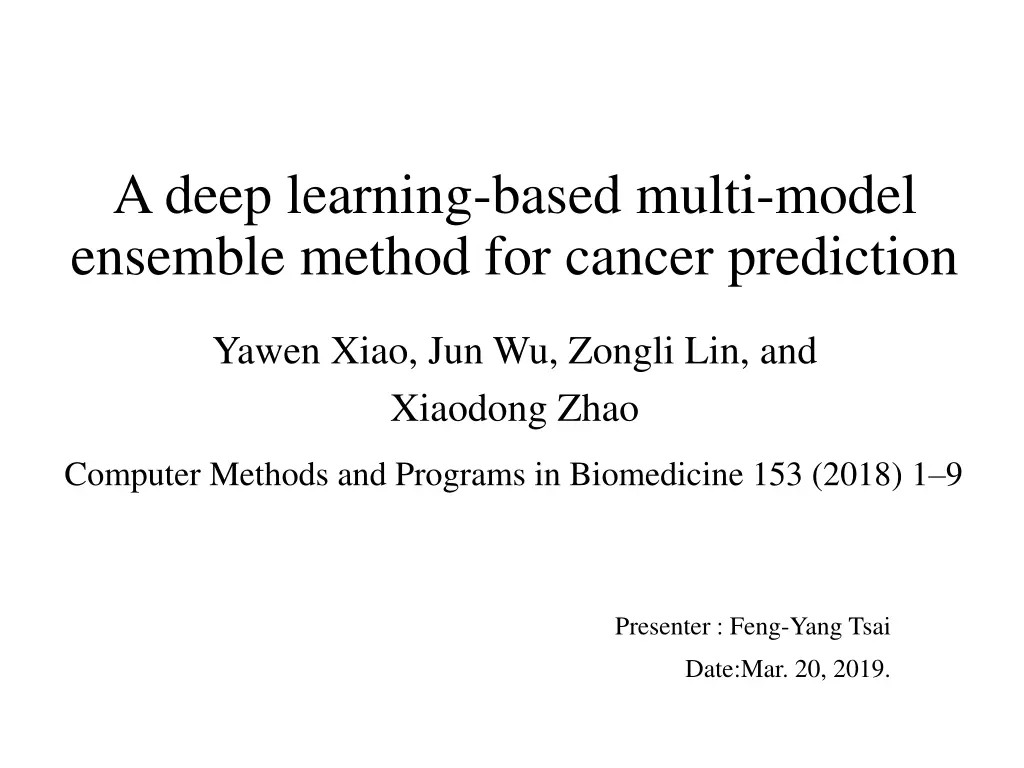
Innovative Cancer Prediction Method Using Multi-Model Ensemble Approach
Discover a cutting-edge approach that leverages deep learning and multiple machine learning models for accurate cancer prediction based on gene expression data. This groundbreaking method combines informative gene analysis with ensemble techniques to enhance predictive outcomes in cancer diagnosis and treatment decisions.
Download Presentation

Please find below an Image/Link to download the presentation.
The content on the website is provided AS IS for your information and personal use only. It may not be sold, licensed, or shared on other websites without obtaining consent from the author. If you encounter any issues during the download, it is possible that the publisher has removed the file from their server.
You are allowed to download the files provided on this website for personal or commercial use, subject to the condition that they are used lawfully. All files are the property of their respective owners.
The content on the website is provided AS IS for your information and personal use only. It may not be sold, licensed, or shared on other websites without obtaining consent from the author.
E N D
Presentation Transcript
A deep learning-based multi-model ensemble method for cancer prediction Yawen Xiao, Jun Wu, Zongli Lin, and Xiaodong Zhao Computer Methods and Programs in Biomedicine 153 (2018) 1 9 Presenter: Feng-Yang Tsai Date:Mar. 20, 2019.
Abstract(1/2) Cancer is a complex worldwide health problem associated with high mortality. With the rapid development of the high-throughput sequencing technology and the application of various machine learning methods that have emerged in recent years, progress in cancer prediction has been increasingly made based on gene expression, providing insight into effective and accurate treatment decision making. Thus, developing machine learning methods, which can successfully distinguish cancer patients from healthy persons, is of great current interest. However, among the classification methods applied to cancer prediction so far, no one method outperforms all the others. In this paper, we demonstrate a new strategy, which applies
Abstract(2/2) deep learning to an ensemble approach that incorporates multiple different machine learning models. We supply informative gene data selected by differential gene expression analysis to five different classification models. Then, a deep learning method is employed to ensemble the outputs of the fiveclassifiers. By taking full advantage of different classifiers, the proposed deep learning-based multi-model ensemble method is shown to be accurate and effective for cancer prediction.
Feature selection : TCGA(The Cancer Genome Atlas Lung Adenocarcinoma (LUAD) Stomach Adenocarcinoma (STAD) Breast Invasive Carcinoma (BRCA) In this paper, we employ the DESeq method to select informative genes for the downstream classification. p=0<0.01
{170,175,178,180} {160,165,168,150} (H0): ( )= ( ) (H1): ( ) ( ) ( )= 148.2253 ( )= 179.8867 ( )= 8.6371 ( )= 8.5540
()=169.6028 ( )=174.1443 ( )= 32.1374 ( )= 30.8397 p=0<0.05 (H0): ( )= ( ) 1 p=0.3092>0.05 (H0): ( )= ( ) 2
Classification methods : GBDT:GB Gradient Boosting 20 26 3 6 3 2 1 1
